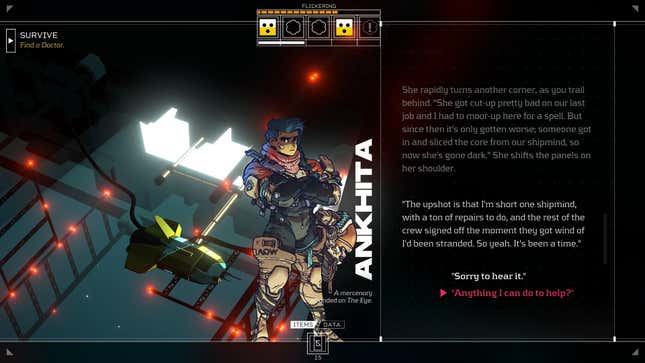Cyberpunk. When you think of the word, you likely conjure up images of a futuristic cityscape awash in neon lights, amalgams of Western-Japanese architecture, and a cybernetic hero equipped with a samurai sword—or a “AAA” game still trying to get its bearings. But what often gets lost in the glitz and synthetic glamor of the word are the larger philosophical ideas and disruptive technology that shaped the genre and that reflect the insecurities of the world we live in. This near-constant missing of the mark in cyberpunk games has me guarded.
Today’s games have interpreted the genre incorrectly. While it’s easy to become enveloped in the power fantasy and the magnificence of transhumanism, these games haven’t spent enough time reflecting on the problems that stem from our relationships with these technologies. Cyberpunk should be an inspection into and a commentary on the power structures that define our world and our places in it.
All this left me ready to stave off cyberpunk games for the foreseeable future until Citizen Sleeper, a recent entry to the genre inspired by table-top RPGs, caught my eye. More promising, Kotaku senior writer Ethan Gatch said it was one of his favorite games of the year so far. I was still wary, but I was ready to give it a go. Thinking I was alone in my tumultuous relationship with cyberpunk, I discovered that Citizen Sleeper’s sole developer and writer Gareth Damian Martin shares many of my concerns about the genre’s trajectory.
Beyond cyberpunk’s reduction to an aesthetic, I’ve noticed the tendency to compare said games with other media. This often takes the form of what have become tired analogies on how a game’s theatrics harken to Blade Runner or Ghost in the Shell. But whenever I ask myself what these modern cyberpunk games are actually saying, I can’t find an answer. They’re mere carbon copy shells of aesthetics without ghosts of their own. Something Martin looked to avoid in making Citizen Sleeper.
In Citizen Sleeper, you play as a copy of a cryogenically frozen person, called a sleeper, who must work to pay off their debts before being disposed of. A dice system within the game determines the condition of your body. Each day, you must decide whether to help others by building mutual aid or to use your money to pay for the drugs that keep you alive.
And though Martin took inspiration from William Gibson, the American-Canadian author who penned works like Neuromancer and is credited as the progenitor of the cyberpunk genre, they took umbrage with the noir power fantasy and future-centric scope that’s proliferated within the genre, even by Gibson himself, much as I have.

I compare the “cyberpunk-adjacent” games guilty of this to the anime Ghost in the Shell: Stand Alone Complex. Unlike newer media that have salvaged pieces of its narrative as a template for their own stories, GitS SAC characterizes every corner of its disrupted world and the citizens within it. Japan is run amok with efficient and invasive technologies.
“The thing that makes cyberpunk feel kind of stagnant is the way that it can feel that we are still drawing on those same structures that were concerns for Gibson [and] Ridley Scott in the 70s and 80s. Things like this abject fear of Japanese dominance and things like this that come through in certain texts. We’re now working removed from those and those are not really our concern,” Martin told me.
Citizen Sleeper, however, has an overwhelmingly positive review score on Steam at the time of publication, with players calling the game a “gem” that “hit the sweet spot” for them with its narrative gameplay. Martin said they didn’t approach writing Citizen Sleeper looking to hit all the checkboxes of the cyberpunk genre. They looked at it simply as an intimate game that shows people coming together and put their own experiences as a nonbinary person who’s worked gigs in a city without enough money to pay rent into the heart of that story.
“I modeled the structures around things in our society now like constant pressure, exposure to risk, the feeling that luck is the only thing that is keeping you with a roof over your head, or waking up in the morning and not knowing exactly how much you’re gonna have to give,” Martin said.
After receiving feedback from players post-launch, Martin said they think players related to the structure in Citizen Sleeper because it allows them to place their own experiences into the framework of the game and explore how the larger structures surrounding and impacting their lives can be “malicious,” “unintentional,” or “just background noise.”
Although cyberpunk today is regarded as a warning on the horizon for the fate of humanity and what we should do to avoid it, Martin said writers of today shouldn’t rehash the prose used in the onset of the genre or take stabs at answering what life will be like in the far-off future. Instead, they said, we should focus on the now.
“For [cyberpunk] to be effective, I find that it needs to draw on something about now because I don’t think that Gibson and [Bruce] Sterling were writing about the future. I think they were writing about the moment they were in,” Martin said. “We should continue to make cyberpunk work about the moment we’re in, not the moment that they were in or this awesome imagined future. I think cyberpunk is about now.”





